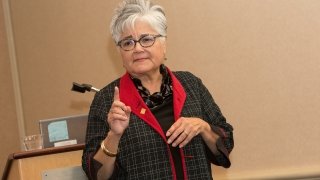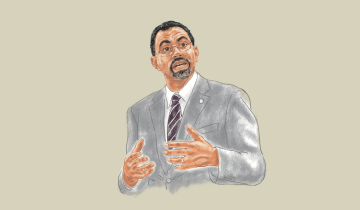A record number of alumni and students came out for the 2013 Leadership Conference hosted by the USC Rossier School of Education and the Dean’s Superintendents Advisory Group (DSAG) on July 25.
The conference, which focused on career pathways and current issues in education, included five panel discussions that addressed various aspects of K-12 and higher education leadership and featured two dozen USC Rossier alums who hold high-level leadership positions in their fields.
Greg Franklin ’83, EdD ’97, superintendent of the Tustin Unified School District and DSAG chair, welcomed more than 300 attendees and urged them to take advantage of the robust Trojan network. He noted his own career path, which included a number of positions in districts led by USC Rossier alumni, including Rudy Castruita EdD ’82 and Michael Escalante EdD ’02, and mentorships that helped his career.
Education needs strong leaders today more than ever, said Franklin, who quoted authors Ronald Heifetz and Marty Linsky, who have written that, “To lead is to live dangerously because when leadership counts, when you lead people through difficult change, you challenge what people hold dear … with nothing more to offer perhaps than a possibility.”
Oliver Sicat ’01, principal of USC Hybrid High School and CEO of Emagine Charter Management Organization, explained how his career path led from founding a nonprofit after-school program to heading the new USC Rossier-designed charter school.
Participants engaged in breakout sessions, where panelists discussed issues in leadership, answered questions and offered advice to the many emerging education leaders in attendance.
Panel participants included Patrick Auerbach EdD ’08, senior vice president for alumni relations at USC, Pedro Garcia EdD ’83, professor of clinical education at USC Rossier, and Hazel Giusto EdD ’11, student services coordinator for Hybrid High.
The conference provided USC Rossier alumni and students with an opportunity to share ideas and discuss topics of importance to education leaders in the K-12 and higher education sectors.
“We are successful educators when we learn from one another,” Giusto said. “Events like this allow a forum for deep conversations about how to keep challenging ourselves to be, do and expect better from our education system.”





